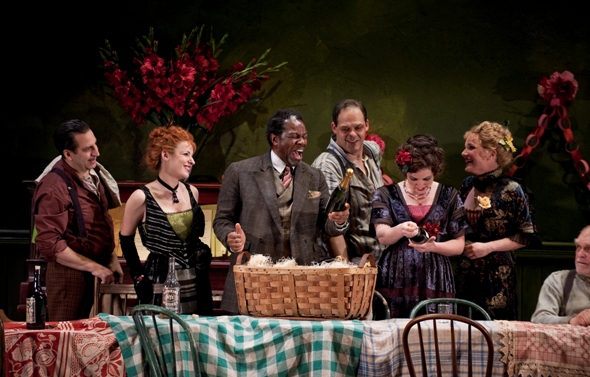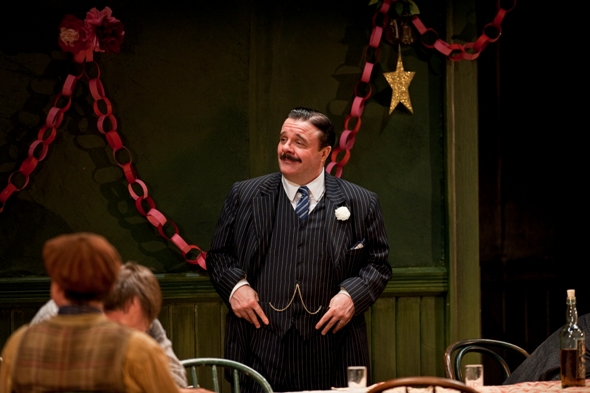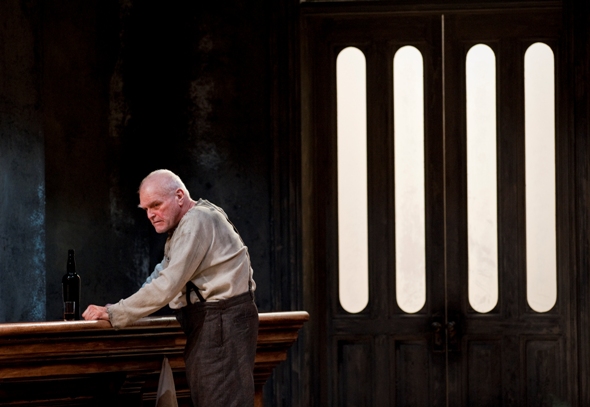Goodman’s well-honed ‘Iceman Cometh’ slices through a boozy, painful cloud of pipe-dreams
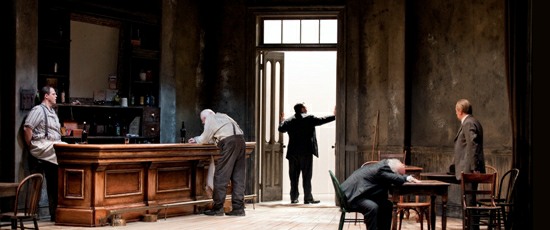 Review: “The Iceman Cometh” by Eugene O’Neill, at the Goodman Theatre through June 17. *****
Review: “The Iceman Cometh” by Eugene O’Neill, at the Goodman Theatre through June 17. *****
By Lawrence B. Johnson
A snoring, half-lit tableau opens the Goodman Theatre’s magnificent production of Eugene O’Neill’s “The Iceman Cometh.” It is a still-life with drunks, a bleary bestiary of inebriates who soon will rouse themselves once more to their cups and their pipe-dreams – only to see solemn illusion shaken by a false prophet of reality, a self-styled messiah whose folly outpaces them all.
 What a sad and hilarious and human spectacle is this “Iceman,” painted into life with precise and loving brushstrokes by director Robert Falls and an indelible cast of characters. But even to praise one aspect of this production first is to unjustly subordinate another. It is a complete triumph, a perfectly harmonized creation from concept and characterization to set designer Kevin Depinet’s multiple perspectives on a melancholy saloon, Merrily Murray-Walsh’s costumes well fitted to a world-worn lot and Natasha Katz’s lighting that adorns, mourns, accentuates and beatifies.
What a sad and hilarious and human spectacle is this “Iceman,” painted into life with precise and loving brushstrokes by director Robert Falls and an indelible cast of characters. But even to praise one aspect of this production first is to unjustly subordinate another. It is a complete triumph, a perfectly harmonized creation from concept and characterization to set designer Kevin Depinet’s multiple perspectives on a melancholy saloon, Merrily Murray-Walsh’s costumes well fitted to a world-worn lot and Natasha Katz’s lighting that adorns, mourns, accentuates and beatifies.
The prodigious homily that is “Iceman,” this five-hour testament of faith in the fabrications that make life tolerable, involves more than a dozen vividly drawn souls but rests ultimately on the galvanizing presence of three – here a blazing convergence of stellar actors: Stephen Ouimette as Harry Hope, the run-down proprietor of a bar in his own likeness; Brian Dennehy as Larry Slade, the philosophical cast-off of an anarchist movement who protests too much his indifference to human affairs and his wish for death; and Nathan Lane as Theodore Hickman (“Hickey”), a traveling salesman and devout tippler whose regular visits to Harry’s place mean great times and flowing booze for everybody.
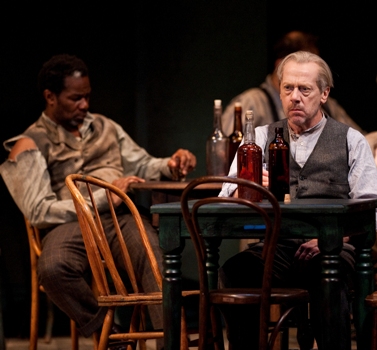 Ouimette’s Irish-accented Hope is a hard-bitten soft touch for the liquor-lapping bunch who rent the rooms above his bar but mostly subsist night and day in a communal daze, mooching drinks and promising to pay up tomorrow. Indeed, this band of the oblivious accept as certain truth that on any tomorrow they could reclaim their forfeited places in society; tomorrow is where their self-esteem resides. Ouimette is the soul of dilapidated drollery, shooting barbed repudiation at his familial circle only to offer a mollifying chaser when the sting is too sharp.
Ouimette’s Irish-accented Hope is a hard-bitten soft touch for the liquor-lapping bunch who rent the rooms above his bar but mostly subsist night and day in a communal daze, mooching drinks and promising to pay up tomorrow. Indeed, this band of the oblivious accept as certain truth that on any tomorrow they could reclaim their forfeited places in society; tomorrow is where their self-esteem resides. Ouimette is the soul of dilapidated drollery, shooting barbed repudiation at his familial circle only to offer a mollifying chaser when the sting is too sharp.
Buying none of it – insisting, railing that he has thrown aside pipe dreams and self-delusion – is Dennehy’s sullen hulk Slade. The beauty of Dennehy’s performance, though, lies not in Slade’s repetitive raillery but in his terrible, stolid, marvelously physical silences. One senses the full weight of an unbearable world on his shoulders, a burden only compounded by a new arrival, the youthful son of a fellow anarchist who was once Slade’s lover. The kid (Patrick Andrews) wants something from Slade – perhaps a father, some answers, absolution – that Slade cannot bring himself to give, and his guttural distress registers in Dennehy as a suffocating torment.
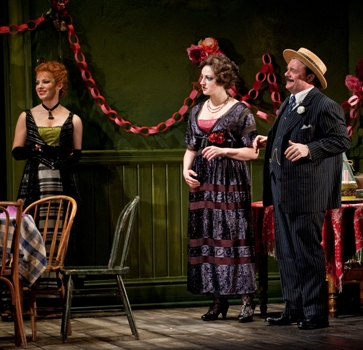 Enter Hickey, in the tidily groomed form of Nathan Lane. It’s Harry Hope’s birthday and everybody’s been waiting for the life of the planned party to show up. Now Hickey’s here, except that it doesn’t seem to be the Hickey they know and love. For one thing, he’s on the wagon; worse, he’s on a moralizing kick, preaching, of all things, reality.
Enter Hickey, in the tidily groomed form of Nathan Lane. It’s Harry Hope’s birthday and everybody’s been waiting for the life of the planned party to show up. Now Hickey’s here, except that it doesn’t seem to be the Hickey they know and love. For one thing, he’s on the wagon; worse, he’s on a moralizing kick, preaching, of all things, reality.
The interesting, and dramatically challenging, thing about Hickey is that for a long stretch he’s really boring. As one of his reluctant flock puts it, he might as well be from the Salvation Army. Hickey says he’s seen the light and shed his own pipe dreams, and he’s here to help every one of these lost souls follow his own wondrous example. He’s a more serene, proselytizing version of Larry Slade: Put down the bottle, come unto me and I will show you the way out of your illusions. Lane is into Hickey’s mission body and soul, and he is profoundly annoying to this gaggle of losers, who begin to succumb to his pitch even as they resent it.
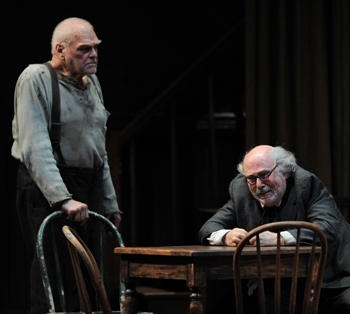 But comes the moment nobody anticipates, when the reformed Hickey explains just how deeply he understands the delusional game his pals have been playing. Empathy turns into confession in one of the most devastating monologues ever written for the stage, by Eugene O’Neill or anyone else. This is where Lane’s stage mastery tells. It is a long, painful revelation, an anguished cry from a broken heart and troubled mind, and Lane holds the listener in thrall through every awful minute and ripping inflection. In essence, this is the payoff of the preceding four hours and it rains gold.
But comes the moment nobody anticipates, when the reformed Hickey explains just how deeply he understands the delusional game his pals have been playing. Empathy turns into confession in one of the most devastating monologues ever written for the stage, by Eugene O’Neill or anyone else. This is where Lane’s stage mastery tells. It is a long, painful revelation, an anguished cry from a broken heart and troubled mind, and Lane holds the listener in thrall through every awful minute and ripping inflection. In essence, this is the payoff of the preceding four hours and it rains gold.
Yet “The Iceman Cometh” is by no means a grinding marathon of misery. Before Hickey puts the kibosh on their fun, these drunks believe themselves happy, the collective embodiment of human potential. Director Robert Falls allows plenty of space for their warmth and jibes to draw us in. There’s Hugo the constantly obliterated old anarchist (Lee Wilkof) who occasionally raises his head long enough to hurl a generalized invective and ask for another drink. And Willie the Harvard Law School alum (John Hoogenakker) who’s good for a bawdy song.
The Boer War is continually re-engaged by a Dutch ex-officer (John Judd) and his British counterpart (John Reeger). There’s the perpetually hammered former war correspondent (James Harris) and the black guy (John Douglas Thompson) who’s officially declared white and accepted as a peer. Rocky the night bartender (Salvatore Inzerillo) keeps a stable of “tarts” – not whores, mind you, because that would make him a pimp. They’re nice goyles (Tara Sissom, Lee Stark, Kate Arrington); one even dreams of marrying Chuck the day bartender (Marc Grapey) – maybe tomorrow.
Related Links:
- Famous Hickey portrayals on Broadway include Jason Robards, James Earl Jones and Kevin Spacey: Check out the details at ibdb.com
- Brian Dennehy shares the essential O’Neill theme on The Interview Show: Watch him on YouTube
- Goodman Theatre artistic director Robert Falls on casting Lane and Dennehy: Watch it at YouTube
- Chicago-born Jason Robards delivers Hickey’s shattering monologue: Watch it at YouTube in three parts here and here and here
- Al Pacino reads from “Iceman” in O’Neill documentary: Watch it at YouTube
- Performance location, dates and times: Details at TheatreinChicago.com
Photo captions and credits: Home page and top: A quiet interlude in the bar: from left, Rocky the night bartender (Salvatore Inzerillo), Larry Slade (Brian Dennehy), Hickey (Nathan Lane), Hugo (Lee Wilkof) and Harry Hope (Stephen Ouimette). Descending: A reformed Hickey (Nathan Lane) makes his pitch to Larry Slade (Brian Dennehy). Joe (John Douglas Thompson, left), the certified “white’ black man, shares a table with bar owner Harry Hope (Stephen Ouimette). Hickey (Nathan Lane) at Harry’s birthday party with two swell tarts (Kate Arrington as Cora, left, and Tara Sissom as Pearl). Same table, different worlds: Larry Slade (Brian Dennehy, left) and Hugo the old-school revolutionary (Lee Wilkof). Below upper: In a partying mood are, from left, Chuck Morello (Marc Grapey), Cora (Kate Arrington), Joe (John Douglas Thompson), Rocky (Salvatore Inzerillo), Pearl (Tara Sissom) and Margie (Lee Stark). Below middle: Nathan Lane as Hickey. Below bottom: Alone with his thoughts – Brian Dennehy as Larry Slade. (Photos by Liz Lauren)
Tags: "The Iceman Cometh", Brian Dennehy, Eugene O'Neill, Kevin Depinet, Merrily Murray-Walsh, Natasha Katz, Nathan Lane, Stephen Ouimette

